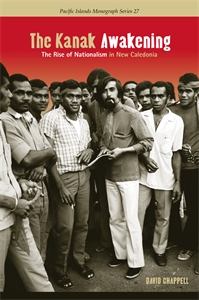The Kanak Awakening: The Rise of Nationalism in New Caledonia
- About the Book
-
In 1853, France annexed the Melanesian islands of New Caledonia to establish a convict colony and strategic port of call. Unlike other European settler–dominated countries in the Pacific, the territory’s indigenous people remained more numerous than immigrants for over a century. Despite military conquest, land dispossession, and epidemics, its thirty language groups survived on tribal reserves and nurtured customary traditions and identities. In addition, colonial segregation into the racial category of canaques helped them to find new unity. When neighboring anglophone colonies began to decolonize in the 1960s, France retained tight control of New Caledonia for its nickel reserves, reversing earlier policies that had granted greater autonomy for the islands. Anticolonial protest movements culminated in the 1980s Kanak revolt, after which two negotiated peace accords resulted in autonomy in a progressive form and officially recognized Kanak identity for the first time. But the near-parity of settlers and Kanak continues to make nation-building a challenging task, despite a 1998 agreement among Kanak and settlers to seek a “common destiny.”
This study examines the rise in New Caledonia of rival identity formations that became increasingly polarized in the 1970s and examines in particular the emergence of activist discourses in favor of Kanak cultural nationalism and land reform, multiracial progressive sovereignty, or a combination of both aspirations. Most studies of modern New Caledonia focus on the violent 1980s uprising, which left deep scars on local memories and identities. Yet the genesis of that rebellion began with a handful of university students who painted graffiti on public buildings in 1969, and such activists discussed many of the same issues that face the country’s leadership today. After examining the historical, cultural, and intellectual background of that movement, this work draws on new research in public and private archives and interviews with participants to trace the rise of a nationalist movement that ultimately restored self-government and legalized indigenous aspirations for sovereignty in a local citizenship with its own symbols. Kanak now govern two out of three provinces and have an important voice in the Congress of New Caledonia, but they are a slight demographic minority. Their quest for nationhood must achieve consensus with the immigrant communities, much as the founders of the independence movement in the 1970s recommended.
- About the Author(s)
-
David A. Chappell, Author
- Reviews and Endorsements
-
- David Chappell has written the first important English language book on New Caledonia for almost two decades. It shows how French colonisation helped unify the Kanaks’ indigenous self-identity. The book uses new documentary and oral research to analysise the interweaving of politics and culture in the rise of Kanak nationalism.
—Australian Journal of Politics and History - A primary strength of this volume is the nuanced methodology employed by David Chappell, a long-established specialist in Pacific history. The various dimensions that led to the events described by the author are carefully contextualized as he navigates between individual trajectories and collective reverberations, local struggles and large national issues, while keeping the global context in sight. Revelatory focal events are situated historically, and repercussions in the present serve as harbingers of issues that arise over time. . . . This extensive analysis of the historical and bifurcating complexity of New Caledonia striving toward independence is a timely contribution, as the territory has entered the ultimate phase of the Noumea agreement. It provides the reader with a striking and richly informed history that could be usefully complemented by political science-oriented and anthropological readings on the construction of a Neo-Caledonian citizenship, in tension especially with the particular legal status (or customary status) attributed to the Kanak.
—The Contemporary Pacific
- David Chappell has written the first important English language book on New Caledonia for almost two decades. It shows how French colonisation helped unify the Kanaks’ indigenous self-identity. The book uses new documentary and oral research to analysise the interweaving of politics and culture in the rise of Kanak nationalism.
- Supporting Resources
-










